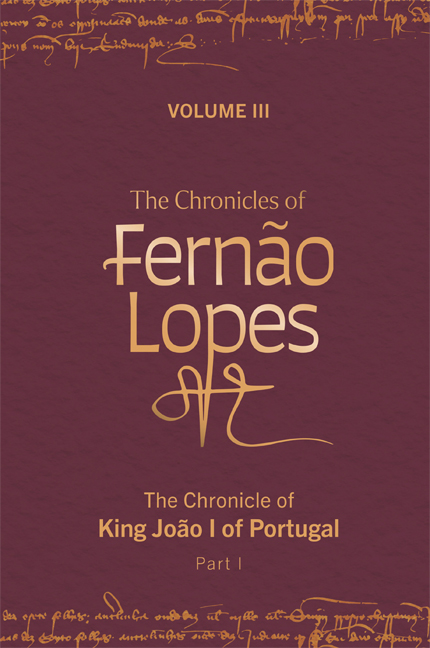Chapter 14 - How the citizens [of Lisbon] tried to rob the Jews, and how the Master forbade them to do so
Published online by Cambridge University Press: 28 December 2023
Summary
After the great tumult with which the people of the city reached the queen's palace and in which the bishop was killed in the manner in which you have heard, there grew up among them a sense of union fostered by mortal hatred against anyone who did not share their opinions, with the result that nowhere was safe for anybody with a different view. Nobody went to work, and their sole occupation was to gather in groups to discuss the count's death and what had happened.
In addition, as it was being said that the King of Castile was making his way in the direction of the realm, they also discussed how it was to be defended. Some people mentioned the name of Prince João, saying that the kingdom was his by right. Others declared that that was impossible, because he was already held captive in Castile, would never be released and might well be put to death for that very reason. As he had indeed been taken prisoner, there was no need for another prince in the country than the Master of Avis, who was a son of King Pedro, just like the other Prince João, and that they should adopt him as their king and liege lord.
Having spent the rest of the day in such discussions, the next morning the people began all over again. Each person expressed an opinion on these matters, and among them there emerged a new agreement, according to which they declared that it was quite all right to rob certain wealthy Jews who dwelt in the Jewish quarter, such as Dom Yehuda, who had been chief treasurer of King Fernando, and Dom David Negro, who had been a trusted counsellor of his, as well as others. From them the Master could acquire very great wealth with which to maintain an honourable estate. As these people conversed with one another as to how to put this plan into operation, a large and excited crowd began to gather round them.
As soon as they realised what was afoot, the Jews did not bother going to the queen. Instead, a number of them rushed to the houses belonging to João Gil, which were close to the cathedral and in one of which the Master had spent the night.
- Type
- Chapter
- Information
- The Chronicles of Fernão LopesVolume 3. The Chronicle of King João I of Portugal, Part I, pp. 40 - 42Publisher: Boydell & BrewerPrint publication year: 2023

